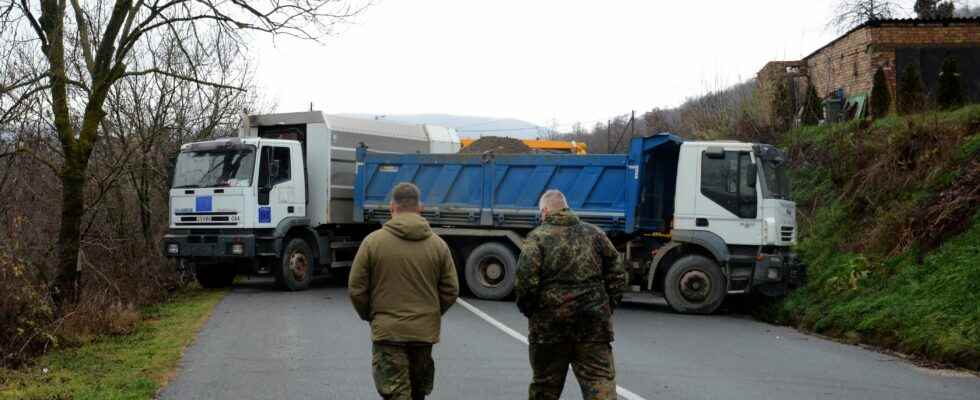France and Europe are concerned as tensions with the Serb minority worsen in northern Kosovo, after exchanges of fire this weekend. For the first time since the end of the war in Kosovo, Serbia announced on Saturday, December 10, its desire to ask NATO for authorization to deploy security forces in the north of the small state. This request is permitted by a UN resolution dating from the end of the war between the former Yugoslavia and the Kosovo Liberation Army, between 1998 and 1999. Belgrade has, in theory, the possibility of deploying up to a thousand soldiers, police or customs officers at Orthodox religious sites, in areas with a Serb majority and at border posts.
Serbian leader Aleksandar Vucic, however, acknowledged that there was “no chance of this request being approved”. The independence of the former Serbian province of Kosovo was pronounced in 2008, and recognized by the United States and the majority of EU countries. But not by Belgrade, which regularly encourages the Serbian population of northern Kosovo to challenge the authority of Pristina, the capital.
Serbian attacks on Kosovar and European police
Tensions have increased in recent days in Serb-majority municipalities in the north of the country, as local elections approach. Saturday, December 10, at the level of the border, dams and barricades had been erected by several dozen Serbs, in order to block the passage of cars between the two countries. They were initially demonstrating against the arrest of a policeman.
But the same evening, the police said they had suffered three successive attacks with firearms on one of the roads leading to the border. “The police units, in a situation of self-defense, were forced to respond with their weapons to the people and criminal groups, who were repelled and left in an unknown direction,” she said in a statement. A unit of the European mission “Eulex” – which has a total of around 4,000 security forces deployed in Kosovo under a UN mandate – was also targeted by a stun grenade. EU Foreign Minister Josep Borrell condemned the attacks and called on Kosovo Serbs to “immediately” remove the barricades, which were renewed on Sunday.
“Calm must be restored”, he tweeted, calling on all protagonists to “avoid escalation”. France also declared itself “very concerned” by these high tensions, and considers the attack against the police forces of the EU “unacceptable”, the Quai d’Orsay told AFP on Monday. Ironically in the current international context, the Kremlin, a close supporter of Belgrade due to ancient historical and religious ties, called for settling tensions between Serbia and Kosovo through “diplomatic means” and “efforts of a peaceful nature”, while demanding that the rights of Serbs be “guaranteed”.
Recognition of Kosovo at the heart of the conflict
The tension is such that the President of Kosovo, Vjosa Osmani, announced on Saturday a postponement to April 23 of the local elections, initially scheduled for December 18. The embassies of France, Germany, Italy, Great Britain and the United States, as well as the representation of the EU, welcomed a “constructive decision” to “advance efforts to achieve a situation safer in the North” of the country.
The main Serbian party had called for a boycott of these elections. The Serbs represent approximately 120,000 inhabitants in Kosovo, out of a total Kosovo population of some 1.8 million people, the overwhelming majority of Albanian origin. Last August, conflicts were already multiplying between the two countries over the recognition of administrative documents and Serbian license plates, near the northern border. In November, demonstrations had already taken place in the Serb-majority town of Mitrovicë, bringing together hundreds of nationalists. Dressed in traditional and medieval costumes, they sang the anthem of Serbia to fight against “the harassment of the Serbs”, then told Politico.
For VOA News, these tensions were already “a reminder of the fragile security and unresolved conflicts” between the two nations, which are based on Serbia’s refusal to recognize its former province as an independent country. While the European Union has been pushing nations for dialogue for years, the fact that five of its members still do not recognize Kosovo lends legitimacy to Belgrade’s position, analyzed the American media at the time.
